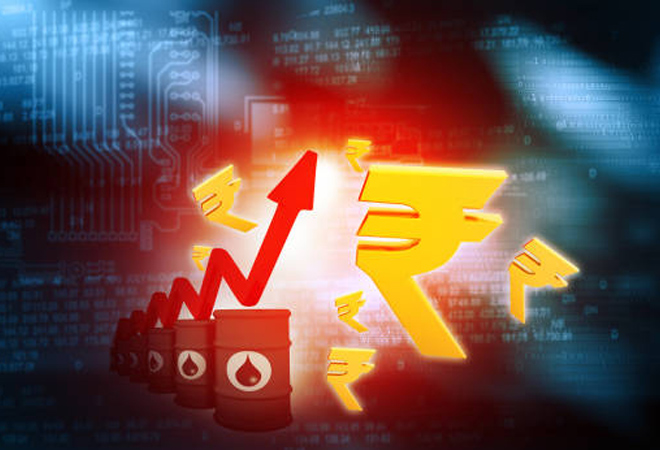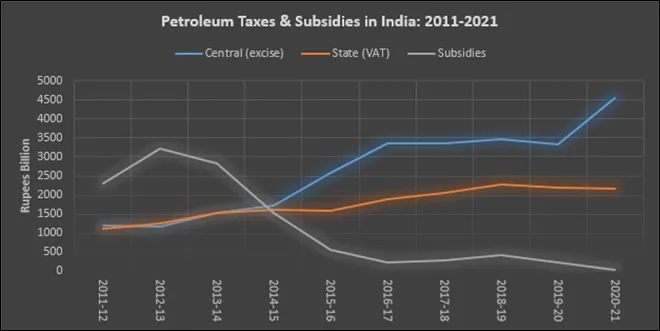-
CENTRES
Progammes & Centres
Location
Energy subsidies are described as hard to reform as they are leveraged by government leaders to secure votes. However, their phasing out is well underway.

This article is part of the series Comprehensive Energy Monitor: India and the World
There is no universally accepted definition of ‘energy subsidies’, or consensus on the method used to estimate subsidies. The IISD (Institute of Sustainable Development), a non-governmental organisation, put India’s fossil fuel subsidies (producer and consumer subsidies for coal, oil & gas) at US$40 billion in 2017–19. The IEA (International Energy Agency) and the OECD (Organisation for Economic Cooperation & Development) give an estimate of about US$10-12 billion for the same period. Other agencies such as the IMF (International Monetary Fund) and WTO (World Trade Organisation) offer different estimates as they define energy subsidies according to their core mandates. Irrespective of the method used, India has always found a place among the top fossil fuel subsidisers in the world. Energy subsidies are described as hard to reform as they are rents offered to secure the support of different interest groups. India has, however, decreased petroleum subsidies substantially in the last ten years without serious political consequences.
Price discounts offered to select petroleum products such as LPG (Liquified Petroleum Gas) and kerosene were a more direct form of subsidy expected to benefit poor households.
India has used the term ‘under-recoveries’ to describe revenue foregone as full pass-through of changes in international crude prices to the retail price of petrol and diesel were not permitted. This may be counted as a form of subsidy. Price discounts offered to select petroleum products such as LPG (Liquified Petroleum Gas) and kerosene were a more direct form of subsidy expected to benefit poor households. Price discounts for LPG and kerosene were later replaced with a direct benefit transfer of the value of the discount to the households. These post-tax consumption subsidies have declined by over 98 percent from a high of over INR3.2 trillion in 2012–13 to about INR36 billion in 2020–21. As a percent of GDP (gross domestic product), petroleum subsidies have decreased by over 94 percent from 1.7 percent of GDP in 2010-11 to about 0.06 percent in 2020-21.
Tax revenue from petroleum products constitutes a large share of the revenue for the Indian government. Since 2014– 15, Central and state taxes have constituted more than half the retail price of petrol and diesel in India. The share of excise duty charged on petroleum contributed over 45 percent of India’s indirect tax revenue in 2020–21. The share of petroleum revenue as a share of total revenue receipts of the central government increased by over 93 percent from 15 percent in 2010-11 to 29 percent in 2020-21. As India heavily taxes the consumption of petroleum while also subsidising the consumption of some petroleum products, it creates a problem when narrow definitions of subsidies are used. Many studies on fossil fuel ‘subsidies’ look only at policies that meet a strict definition of setting prices below the full cost of the energy service. Given that in 2020–21, the tax take on petroleum products was more than 100 times the petroleum subsidy-outgo, it will not be incorrect to say that consumers of petroleum products essentially ‘subsidise’ government budgets.
Many studies on fossil fuel ‘subsidies’ look only at policies that meet a strict definition of setting prices below the full cost of the energy service.
Noted energy economist David Victor has argued that though energy subsidy reform, particularly fossil fuel subsidy reform, is presented as a no-regret or win-win move for developing countries (reduction in fiscal deficit and reduction of fossil fuel use leads to a reduction in carbon emissions), it is hard to carry out because subsidies are deeply rooted in political logic that is difficult to alter. Starting with the assumption that government leaders’ goal is to stay in power, Victor observes that government leaders will channel resources to interest groups that will vote or donate to their political campaign. Applied to the Indian case, petroleum product subsidies have traditionally targeted the voting population, primarily from poor and middle-class households. Since 2014–15, there is a clear shift away from these welfare provisions (universal price discounts, direct transfer of benefits to consumers). The fall in crude oil prices in the mid and late 2010s (global economic slow-down followed by the pandemic) initially opened up the space for phasing out subsidies. Though this space of low crude oil prices has closed since the early 2020s, the phasing out of subsidies has prevailed. It has in some sense initiated the creation of a ‘market for energy’ that will benefit the latter interest group of corporate donors that support the goal of the government to stay in power. The embrace of identity politics of the right by the government, and also by the media outlets controlled by corporate donors, has created a zero-sum competition between dominant and minority identities distracting attention from energy and other handouts. The move away from energy welfare politics, which includes but is not limited to phasing out petroleum subsidies without serious political or social consequences, demonstrates that the government is as powerful in its interventions in the market as it is in its withdrawal from it.
 Source: Reports of the Petroleum Planning & Analysis Cell
Source: Reports of the Petroleum Planning & Analysis Cell
The views expressed above belong to the author(s). ORF research and analyses now available on Telegram! Click here to access our curated content — blogs, longforms and interviews.

Akhilesh Sati is a Programme Manager working under ORFs Energy Initiative for more than fifteen years. With Statistics as academic background his core area of ...
Read More +
Ms Powell has been with the ORF Centre for Resources Management for over eight years working on policy issues in Energy and Climate Change. Her ...
Read More +
Vinod Kumar, Assistant Manager, Energy and Climate Change Content Development of the Energy News Monitor Energy and Climate Change. Member of the Energy News Monitor production ...
Read More +